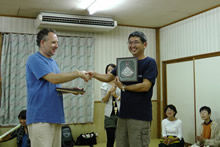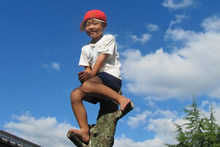By Andrew McAulay (Chairperson of Management Committee, PCD)
 It has been six months since we visited Japan and I have forgotten many of the details of our trip. Yet several deep impressions remain with me to this day, testifying to the impact of our experience.
It has been six months since we visited Japan and I have forgotten many of the details of our trip. Yet several deep impressions remain with me to this day, testifying to the impact of our experience.
Returning to the land
One theme worth contemplating is the return of young people to rural areas. From the people we met, we gathered that there is a trend – or perhaps the beginnings of a trend – of disillusioned urban dwellers returning to the land to practice healthy, sustainable ways of growing food and being a part of the local community. It would seem that for some, the courage to abandon the values and dictates of our industrial growth society for the simpler and often physically harder life on a Farm has brought a level of contentment and meaning to their lives that they had forgotten – or perhaps not known - was possible.
Amongst ourselves we discussed what conditions are necessary for people to be willing to return to rural areas. China's policy of addressing increasing food requirements, in the face of the growing shortage of rural labour, by rapid conversion to large scale, industrial, fossil fuel-dependent agribusiness, seems to us like a disaster in the making. Most experts agree that global oil production is peaking – or will soon peak - and that rapidly escalating prices will follow. From PCD's point of view, a sustainable future for humanity will require a concerted effort towards reestablishing local, community-based, co-operative economies that support simple, healthy lifestyles, with minimal dependence on fossil fuels. Could it be that it requires an economy as developed as that of Japan for people to begin to see the limitations (physical, emotional, spiritual) of the dominant socio-economic system and the advantages of simpler, greener, community living? Could it be that it requires a culture as rich and spiritually-deep as Japan's for modern people to be able to live together in harmony on the land?
Trust nature's harmony and abundance
Those who we met in Japan who were pushing the boundaries of convention were not all young! 73 year old Kawaguchi-san, who we met in Nara Prefecture, is one of the world's foremost practitioners and teachers of 'natural farming' – in the tradition of Masanobu Fukuoka, author of "The One Straw Revolution". As he stood in his field, patiently and serenely demonstrating to us the principles of natural farming: Don't disturb the soil, Don't label creatures as 'pests', Return what you don't need to the soil, Trust nature's harmony and abundance… I began to see that this philosophy has both wider and deeper applications: wider in the sense that it might be applicable to other aspects of living; deeper in the sense that it may provide a key to how we deal with our own thoughts and emotions…
All of what we were learning and witnessing resonated well with the philosophy of our hosts for the first part of our trip: The Sloth Club. Conceived by the delightful Keibo-san, the name of this NGO reminds us that sometimes, what society perceives as a waste of time may in fact contain great wisdom. As Keibo-san explained, the sloth lives high up in a tree, needing very little to sustain her since she moves so slowly. Equally, she produces minimal 'waste' - and when she does feel the need to excrete, she takes the time to descend to the base of the tree and dig a hole so that her excrement can in turn bring maximum nourishment to the being which sustains her.
Freedom from attachment is the key
The second half of our trip was spent in one of the intentional communities of the Yamagishi Association. All of us ended up marveling at the uplifting energy that we felt and comparing the merits of different ways of structuring society. Three core principles govern life in a Yamagishi community: Oneness, No ego and No possessions… It struck me that these principles are easily misinterpreted but, if correctly understood, provide a kind of doorway to heaven. As outlined in the philosophy of many other Oriental traditions, freedom from attachment is the key: what may appear as denial and sacrifice in fact lifts the veil of the mind, with all its intrigue and traps, to reveal the raw, blissful and stupendous energy of existence – of our own being. There are simply no words to describe the joy, the power and the freedom that is the birthright of each one of us – so I will say no more!
Many exquisite interactions took place with members of the Yamagishi community. It was explained to us that members are initiated through a process called 'Tokkoh', a week long closed-door session of deep reflection and dialogue, aimed at uncovering all our hidden motives and misconceptions about the world and each other. For the process to succeed, I imagine that the facilitators must be expertly skilled in the art of challenging participants whilst remaining non-judgmental, like a mirror. However, it was very difficult to obtain more information – whenever we asked, we were told that the only way to know is to experience it… Then, during one evening small group interaction, a question asked by a member of our group was politely thrown back at her – to which the PCD person replied, "Are you trying to 'Tokkoh' me?" Amidst great laughter, the Yamagishi member exclaimed in return: "How did you know?!"
The deepest impression
There was so much for us to learn in Japan and above all, it was the courtesy, the respect and the love shown to us by all our hosts that left the deepest impression. There were a few tears on the final day as we recapped our adventure and reflected on our good fortune in having had such a wide variety of uplifting experiences. As we shared with each other the moments of deepest impact, there was one image which kept springing to my mind: that of an 80 year old boatman who had guided us around a section of Lake Biwako Strong, thin and sinewy, gripping the tiller and bouncing up and down on his seat, radiating warmth and laughter, delighting in his stories of the lake when he was a boy, his explanation of the simple experiment that he was carrying out on the growth rate of the reeds with his ruler and his excuses for allowing the small boat to run into various obstacles whilst he became distracted by our conversation ("I have to give you something to remember!"), this gentleman must surely qualify as one of Japan's Living Treasures.
All in all, it seems that the wisdom of the ancient sages has been guiding us as we explore humanity's plight and seek out a way forward that reflects who we truly are and allows us to give expression to our deepest longings. The meetings which took place on our trip, between groups of (mostly) Chinese and Japanese with shared values and concerns, have played a small but important part in the reconciliation of cultures and the restoration of love amongst humans.
Notes:
- Oneness:Harmony between human beings and nature; No ego: Eliminate selfish motives ; No possession: Eliminate all private asset.
Other related stories:
-
Mr Andrew McAulay, Chairperson of Management Committee, PCD: "Reflections on PCD's Trip to Japan in September 2011"
-
Partners' Sharing:
i. A trip that shook and swayed my heart ~ Ding Ying (Assistant Researcher, Institute of Biotechnology, Guizhou Academy of Agricultural Science) ii. Love without border: happiness is a kind of giving ~ Lei Jing (Lecturer,, College of Agriculture, Guangxi University) iii. Tokkoh—A beautiful kind of brainwashing ~ Lu Wendong (Assistant to Director, Guangxi Museum of Nationalities) iv. Cultivating one's mind before cultivating the land—Knowing "Natural Farming" anew ~ Sun Qiu (Director, Guizhou Institute of Integrated Rural Development, Guizhou Academy of Agricultural Science) v. How to love our home town from the bottom of our heart? ~ Wang Xiao Bo (Programme Advisor, Yunnan Office of PCD) -
Introduction to Main Visits:
i. Natural Farming ii. Sloth Club iii. Yamagishi Association - PCD Japan Study Trip Itinerary





